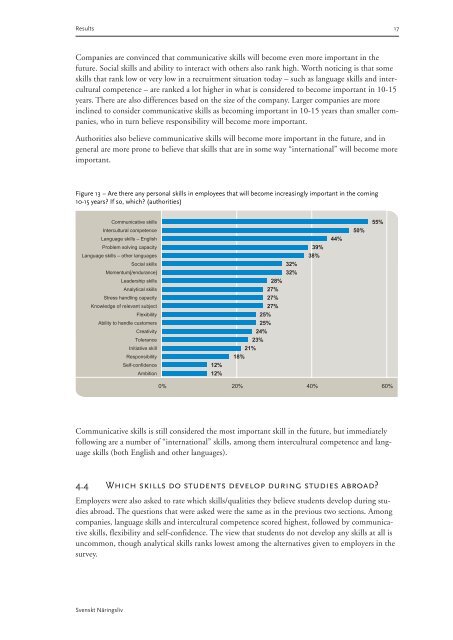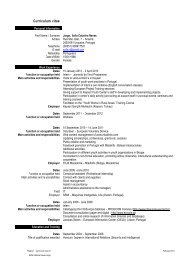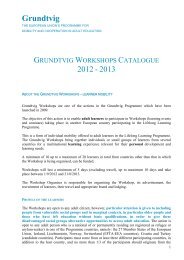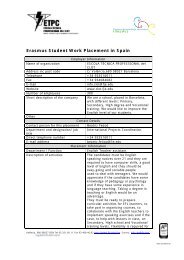Employers' view on studies abroad - Svenskt Näringsliv
Employers' view on studies abroad - Svenskt Näringsliv
Employers' view on studies abroad - Svenskt Näringsliv
Create successful ePaper yourself
Turn your PDF publications into a flip-book with our unique Google optimized e-Paper software.
Results 17<br />
Companies are c<strong>on</strong>vinced that communicative skills will become even more important in the<br />
future. Social skills and ability to interact with others also rank high. Worth noticing is that some<br />
skills that rank low or very low in a recruitment situati<strong>on</strong> today – such as language skills and intercultural<br />
competence – are ranked a lot higher in what is c<strong>on</strong>sidered to become important in 10-15<br />
years. There are also differences based <strong>on</strong> the size of the company. Larger companies are more<br />
inclined to c<strong>on</strong>sider communicative skills as becoming important in 10-15 years than smaller companies,<br />
who in turn believe resp<strong>on</strong>sibility will become more important.<br />
Authorities also believe communicative skills will become more important in the future, and in<br />
general are more pr<strong>on</strong>e to believe that skills that are in some way “internati<strong>on</strong>al” will become more<br />
important.<br />
Figure 13 – Are there any pers<strong>on</strong>al skills in employees that will become increasingly important in the coming<br />
10-15 years? If so, which? (authorities)<br />
Communicative skills<br />
Intercultural competence<br />
Language skills – English<br />
Problem solving capacity<br />
Language skills – other languages<br />
Social skills<br />
Momentum[/endurance]<br />
Leadership skills<br />
Analytical skills<br />
Stress handling capacity<br />
Knowledge of relevant subject<br />
Flexibility<br />
Ability to handle customers<br />
Creativity<br />
Tolerance<br />
Initiative skill<br />
Resp<strong>on</strong>sibility<br />
Self-c<strong>on</strong>fidence<br />
Ambiti<strong>on</strong><br />
12%<br />
12%<br />
28%<br />
27%<br />
27%<br />
27%<br />
25%<br />
25%<br />
24%<br />
23%<br />
21%<br />
18%<br />
32%<br />
32%<br />
39%<br />
38%<br />
44%<br />
50%<br />
55%<br />
0% 20% 40% 60%<br />
Communicative skills is still c<strong>on</strong>sidered the most important skill in the future, but immediately<br />
following are a number of “internati<strong>on</strong>al” skills, am<strong>on</strong>g them intercultural competence and language<br />
skills (both English and other languages).<br />
4.4 Which skills do students develop during <strong>studies</strong> <strong>abroad</strong>?<br />
Employers were also asked to rate which skills/qualities they believe students develop during <strong>studies</strong><br />
<strong>abroad</strong>. The questi<strong>on</strong>s that were asked were the same as in the previous two secti<strong>on</strong>s. Am<strong>on</strong>g<br />
companies, language skills and intercultural competence scored highest, followed by communicative<br />
skills, flexibility and self-c<strong>on</strong>fidence. The <str<strong>on</strong>g>view</str<strong>on</strong>g> that students do not develop any skills at all is<br />
uncomm<strong>on</strong>, though analytical skills ranks lowest am<strong>on</strong>g the alternatives given to employers in the<br />
survey.<br />
<strong>Svenskt</strong> Näringsliv
















